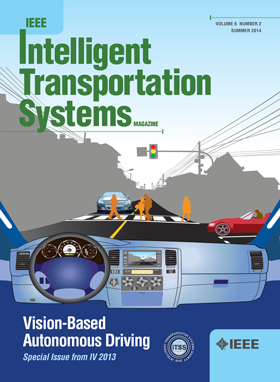FEMASF: An SVD-Based Algorithm for Accurately Estimating the Mounting Angle and Scale Factor
IF 7.9
1区 工程技术
Q1 ENGINEERING, CIVIL
IEEE Transactions on Intelligent Transportation Systems
Pub Date : 2025-02-27
DOI:10.1109/TITS.2025.3543255
引用次数: 0
Abstract
Accurately estimating the position and attitude of vehicles is essential for intelligent transportation systems. The GNSS/INS integrated system offers precise navigation information. However, the system’s positioning errors may accumulate rapidly in challenging GNSS signal conditions. Odometer (ODO) and nonholonomic constraints (NHC) are commonly employed to mitigate the rapid accumulation of INS errors. Compensating for the mounting angles of INS and the scale factor of the odometer is necessary to fully exploit the potential of ODO/NHC. However, many studies employ Kalman filters with small mounting angle assumption, which limits their applicability for large mounting angles in practice. To accurately estimate the mounting angle of INS with any installation attitude, we propose a new algorithm called Fast Estimation of Mounting Angle and Scale Factor (FEMASF). FEMASF employs Singular Value Decomposition (SVD) to obtain a closed-form solution for the parameters. It also incorporates an enhanced Sage-Husa scheme, enhancing overall estimation accuracy by reducing the weight of outlier data through a forgetting factor. Extensive simulation experimental results demonstrate that our proposed FEMASF algorithm outperforms filter-based methods in terms of accuracy and convergence speed for large mounting angles. Specifically, for the −90° mounting angle, FEMASF achieves 0.45° angle error, while the velocity-based Kalman filter (VKF) fails to converge and the position-based Kalman filter (PKF) yields about 4° error. Furthermore, neither VKF nor PKF converges for the 120° mounting angle, whereas FEMASF exhibits only about 3.2° estimation error.FEMASF:一种基于奇异值分解的精确估计安装角度和比例因子的算法
准确估计车辆的位置和姿态对智能交通系统至关重要。GNSS/INS 集成系统可提供精确的导航信息。然而,在具有挑战性的 GNSS 信号条件下,系统的定位误差可能会迅速累积。通常采用里程表(ODO)和非整体约束(NHC)来减少 INS 误差的快速累积。要充分利用 ODO/NHC 的潜力,就必须对 INS 的安装角度和里程表的比例因子进行补偿。然而,许多研究采用的卡尔曼滤波器假定安装角较小,这限制了其在实际应用中对大安装角的适用性。为了准确估计 INS 在任何安装姿态下的安装角,我们提出了一种名为 "快速估计安装角和比例因子(FEMASF)"的新算法。FEMASF 采用奇异值分解法 (SVD) 获得参数的闭式解。它还采用了增强型 Sage-Husa 方案,通过遗忘因子降低离群数据的权重,从而提高整体估算精度。广泛的模拟实验结果表明,我们提出的 FEMASF 算法在大安装角的精度和收敛速度方面优于基于滤波器的方法。具体来说,对于-90°安装角,FEMASF 算法可实现 0.45° 的角度误差,而基于速度的卡尔曼滤波器(VKF)无法收敛,基于位置的卡尔曼滤波器(PKF)则会产生约 4° 的误差。此外,VKF 和 PKF 在 120° 安装角时都没有收敛,而 FEMASF 只出现约 3.2° 的估计误差。
本文章由计算机程序翻译,如有差异,请以英文原文为准。
求助全文
约1分钟内获得全文
求助全文
来源期刊

IEEE Transactions on Intelligent Transportation Systems
工程技术-工程:电子与电气
CiteScore
14.80
自引率
12.90%
发文量
1872
审稿时长
7.5 months
期刊介绍:
The theoretical, experimental and operational aspects of electrical and electronics engineering and information technologies as applied to Intelligent Transportation Systems (ITS). Intelligent Transportation Systems are defined as those systems utilizing synergistic technologies and systems engineering concepts to develop and improve transportation systems of all kinds. The scope of this interdisciplinary activity includes the promotion, consolidation and coordination of ITS technical activities among IEEE entities, and providing a focus for cooperative activities, both internally and externally.
 求助内容:
求助内容: 应助结果提醒方式:
应助结果提醒方式:


